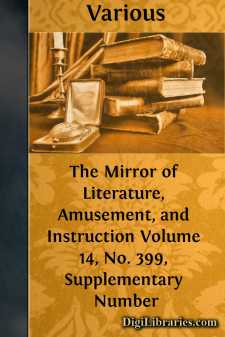Categories
- Antiques & Collectibles 13
- Architecture 36
- Art 48
- Bibles 22
- Biography & Autobiography 813
- Body, Mind & Spirit 142
- Business & Economics 28
- Children's Books 15
- Children's Fiction 12
- Computers 4
- Cooking 94
- Crafts & Hobbies 4
- Drama 346
- Education 46
- Family & Relationships 57
- Fiction 11828
- Games 19
- Gardening 17
- Health & Fitness 34
- History 1377
- House & Home 1
- Humor 147
- Juvenile Fiction 1873
- Juvenile Nonfiction 202
- Language Arts & Disciplines 88
- Law 16
- Literary Collections 686
- Literary Criticism 179
- Mathematics 13
- Medical 41
- Music 40
- Nature 179
- Non-Classifiable 1768
- Performing Arts 7
- Periodicals 1453
- Philosophy 64
- Photography 2
- Poetry 896
- Political Science 203
- Psychology 42
- Reference 154
- Religion 513
- Science 126
- Self-Help 84
- Social Science 81
- Sports & Recreation 34
- Study Aids 3
- Technology & Engineering 59
- Transportation 23
- Travel 463
- True Crime 29
The Mirror of Literature, Amusement, and Instruction Volume 14, No. 399, Supplementary Number
by: Various
Categories:
Description:
Excerpt
Verona
SPIRIT OF THE ANNUALS FOR 1830.
Fair and gentle readers, we present you with a kaleidoscopic view of some of these elegant trifles—the very bijouterie of art and literature—in picture outmastering each other in gems of ingenuity, and in print, exalting a thousand beautiful fancies into a halo of harmony and happiness for the coming year. We call these "trifles," but in the best sense of the term—ay, the air-plants of literature, whose light flowers and fancies shoot up and entwine with our best affections, and even lend a charm to the loveliest of their objects.
We commence with
almost the "youngling of the flock," which contains the original of the annexed Engraving, by W.J. Cooke, appended to which is the following illustrative sketch:—
VERONA.
By Mrs. Maria Callcott.
The drawing from which our engraving is made, is one of the relics of the late Mr. Bonington, whose early death has caused such great and just regret to the lovers of painting. It represents one of those ancient towers, and one of those magnificent palaces, (the Maffei Palace), which distinguish the city of Verona, and, by their peculiar character mark it both as the ancient Gothic capital of northern Italy, and as one of the great principalities of the middle ages.
Verona is indebted to nature for part of the charms it possesses for a traveller. It is nearly surrounded by the broad and rapid Adige: the hills towards the Tyrol have a majestic character, which, as they approach the city, is softened by vineyards, and fields, and gardens, between agreeable villas or groves of cypress. The dress of the people is picturesque; their habits are cheerful, and their manners kindly.
Besides all this, there is scarcely a city, even in Italy, to which we attach a more romantic interest than to Verona. Under its ancient Gothic name of Bern, it is the scene of many of the Teutonic tales which are woven into the Book of Heroes, and the song of the Nibelung. The poets and novelists of the middle ages have also laid the scenes of many of their enchanting tales in this beautiful city; and our own Shakspeare has brought Verona so home to every English reader, that we feel almost to have a right of possession in the place.
Originally a city of the Rhetians, Verona became a Roman colony about the time of Julius Caeser, who caused its inhabitants to be enrolled among the number of Roman citizens. Its most flourishing periods under the empire were the reigns of Vaspasian and of Hadrian, when various temples, and other public buildings, of which some fragments still remain, were erected, and the magnificent ampitheatre, which is still used for scenic representations, was built. It was under the reign of Trajan, that Verona received its first Christian Bishop, Euprepius; and in that of Dioclesian, that its martyrs, Fermus and Rusticus, suffered. The conquest of the city by Constantine, and the fearful battle fought in its immediate neighbourhood between Stilicho and Attila, produced little change in the condition of Verona, which continued to partake of the general fortunes of the empire, until the reign of Theodoric the Great....












